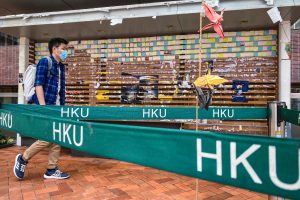Hong Kong educators warn of a chilling effect after a teacher was barred from teaching for life after allegedly using materials touching on local independence.
In an unprecedented move, education authorities deregistered a teacher at Alliance Primary School accused of spreading pro-independence messages in a case dating back to early last year. The decision was made despite the teacher having been cleared by an internal investigation at the private school. The teacher planned lessons requiring students to spend 50 minutes studying the banned pro-independence Hong Kong National Party – and watch a documentary featuring the party’s convener – as well as the city’s Societies Ordinance. Students were also told to discuss independence in Xinjiang, Tibet, and Taiwan.
The decision marks the first time a teacher’s license has been revoked by the education bureau due to classroom materials, and has exacerbated concerns over education freedom in the semi-autonomous territory following the passing of a controversial national security law in June. While the case took place prior to the new law – which criminalizes advocating for independence and has no retroactive effect, according to authorities – officials say the teacher’s actions still violate the Basic Law, Hong Kong’s mini-constitution.
“The situation has deteriorated very quickly. Most teachers have not foreseen this,” said Raymond Yeung, a 30-year-old educator who taught at an elite secondary school before resigning earlier this year. He was blinded in one eye by an alleged police projectile during last year’s protests. “We used to believe we still have protections from the chaotic situation in the political sector. (Now) I think there is a red line, which would be national security. You can see they’re trying to use whatever means to impose this. To be frank, I’m afraid too.”
Last week, more than 20,000 teachers, students, and parents took part in an email campaign protesting the decision, calling it “political suppression.” The city’s largest teachers’ union has also accused officials of carrying out an unfair investigation. Yet Hong Kong’s leader Carrie Lam defended the bureau’s move, saying the teacher was disqualified following a “thorough probe” and vowing to “weed out the bad apples” from the sector. Chinese state media outfit People’s Daily also supported the decision in a commentary last Thursday, slamming the “poison of colonial education” in Hong Kong.
Such developments have embroiled the city in a heated public debate over the role of teachers, who have been accused of influencing Hong Kong’s recent youth-led pro-democracy protests. The Education Bureau has investigated more than 200 complaints against misconduct of teachers from June last year to August this year, according to state-run media outlet Xinhua.
This week, former city leader C.Y. Leung published personal information on 18 teachers allegedly charged for offenses related to the protests in a Facebook post – including their names, ages, and respective institutions – arguing that public interest overrides privacy concerns. Weeks before, Leung took the education authorities to court for failing to publicize the identities of teachers prosecuted for misconduct. The legal challenge has been criticized by education-sector lawmaker Ip Kin-yuen, who likened it to Cultural Revolution-esque “political persecution” designed to weaponize the law against teachers, Apple Daily reports.
Now, teachers are grappling with censorship and growing increasingly worried about potential attacks from pro-establishment groups and individuals, according to Yeung. The bureau also announced last month it will begin providing ethics training courses for teachers covering national security and rule of law – courses that will be organized with prominent pro-Beijing politician Rita Fan, local news site HK01 reports. Yeung, who previously taught liberal studies, says it will be difficult for students and teachers to have open discussions on political issues in schools moving forward.
Last month, a teenager displaying a profile picture during online classes that showed a flag bearing the slogan “Free Hong Kong, Revolution Now” was suspended from school for a week. Earlier this year, a student mounted a legal bid to overturn a ruling that removed a controversial exam question asking if Japan “did more good than harm to China between 1900 and 1945,” and a music teacher was dismissed for allegedly allowing students to play the protest anthem “Glory to Hong Kong.” The song was banned from schools in the wake of the national security law’s enactment.
Between June 2019 to May this year, 100 primary and secondary school teachers and staff – as well as 10 staffers from tertiary educational institutions – have been arrested in relation to the protests, Education Bureau statistics show. During that period, some 1,700 people under the age of 18 were also arrested.
“I think we can’t really fight the establishment, but we can think more about how to impose another type of education in civil society,” said Yeung, adding that some teachers are considering publicizing free, alternative teaching materials online, publishing books, and organizing union actions with groups that have similar concerns. “We don’t really know what the limitations are. Until we find the actual boundaries, we can only try to be safer than before.”
































